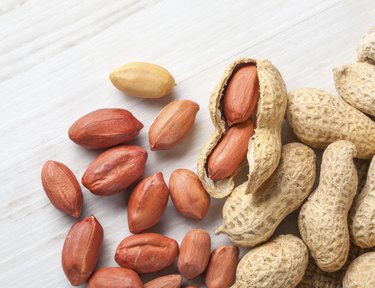
Raw, roasted or ground into butter, people eat peanuts in a variety of ways. Peanuts have also been noted for their health benefits, such as protein, fiber and vitamin E. Less well known is that nutrients are hidden in the papery skin that's often discarded before you consume peanuts. Incorporating peanut skins into the diet can have a positive health influence.
Antioxidants
Video of the Day
Peanut skins, which make up about 3 percent of a peanut seed, are rich in phenolic compounds, meaning they are antioxidant rich. Antioxidants help protect the body from oxidative stress, which occurs in cases of various cancers and diseases. A 2012 study from North Carolina University, published in the "Journal of Food Science," reported that adding a 5 percent concentration of peanut skins to peanut butter significantly increased its antioxidant levels without sacrificing taste or texture.
Video of the Day
Roasted, Raw or Blanched
The same 2012 study published in the "Journal of Food Science" helped show that roasted peanut skins have higher levels of antioxidant-rich phenolic compounds than their raw counterparts. The study also mentioned that roasting resulted in a higher antioxidant yield in both the peanut and skin as compared to blanched or raw peanuts. The roasted peanut skins were also shown to have a higher antioxidant content than either vitamin C or green tea.
Resveratrol
Peanut skins also contain the powerful compound known as resveratrol, found in grapes and wine as well. Resveratrol has been known to help increase endurance, reduce inflammation, and help protect against the risk of developing heart disease. Unlike the phenolic compounds, roasted peanuts contain low amounts of resveratrol. The highest amount of resveratrol is found in Southern-style boiled peanuts, which contain more resveratrol than either red wine or grape juice.
Summary
Whether they are boiled, roasted or ground into peanut butter, adding peanut skins into the diet can have many positive effects on health. Peanut skins contain higher levels of antioxidants than the peanut itself, and even more than green tea or red wine. Roasting results in the highest levels of phenolic compounds, while boiling results in higher levels of resveratrol. Next time you reach for antioxidant-rich peanuts for a snack or to make your own peanut butter, leave the skins to yield more nutrition and positive health benefits.